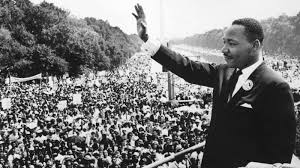Martin Luther King Jr. Day: Honoring a Legacy of Equality, Justice, and Peace
Martin Luther King Jr. Day, celebrated annually on the third Monday of January, is a day of remembrance and reflection on the life and legacy of one of the most influential figures in American history. The holiday, which honors the birthday of Dr. King (born January 15, 1929), offers an opportunity for the nation to reflect on the progress made in civil rights and social justice, while acknowledging the ongoing work necessary to achieve true equality.

Dr. King’s leadership during the Civil Rights Movement, his advocacy for nonviolence, and his unwavering commitment to justice have made him an enduring symbol of hope and change. His messages of love, peace, and unity continue to inspire individuals worldwide as they strive to address the social injustices that still persist. On this day, the country comes together to honor his memory, reflect on the struggles of the past, and renew the collective resolve to continue fighting for a better, more just world.
This article will explore the history and significance of Martin Luther King Jr. Day, the man behind the holiday, and the broader context of civil rights struggles in America. Through an examination of King’s life and work, we will better understand how his legacy continues to shape the way we approach issues of race, inequality, and social justice.
The Civil Rights Movement and Dr. King’s Role
The Civil Rights Movement of the 1950s and 1960s was a pivotal period in American history. It was marked by widespread efforts to end racial segregation, secure voting rights for African Americans, and eliminate discriminatory practices that had long marginalized Black people in the United States. At the forefront of this movement was Dr. Martin Luther King Jr., whose commitment to nonviolence and civil disobedience became hallmarks of the movement.
King’s leadership emerged at a time when African Americans were increasingly dissatisfied with the status quo. Jim Crow laws, which enforced racial segregation in the Southern states, were still in full effect, and discrimination permeated nearly every aspect of society. Black Americans were routinely denied access to quality education, healthcare, and housing, and were subject to violence and intimidation by white supremacist groups.
King, however, believed that true change would only come through peaceful resistance and a commitment to love and reconciliation. He was deeply influenced by the teachings of Mahatma Gandhi, who had used nonviolent protest to challenge British colonial rule in India. King’s philosophy of nonviolence was rooted in his Christian faith, and he often quoted the Bible in his speeches, reminding his audience of the need for compassion and forgiveness.
One of the most significant milestones of King’s leadership was the Montgomery Bus Boycott, which began in 1955 after Rosa Parks, an African American woman, was arrested for refusing to give up her seat to a white person on a segregated bus. The boycott, which lasted over a year, was a powerful act of civil disobedience that drew national attention to the injustices of segregation. King was chosen as the president of the Montgomery Improvement Association, and his leadership helped galvanize the Black community in their fight for equal rights.
The success of the Montgomery Bus Boycott was just the beginning of a broader movement that would lead to major legal and social changes in America. King’s eloquent speeches, including his famous “I Have a Dream” speech delivered during the 1963 March on Washington, rallied millions of people to join the cause for civil rights. In his speech, King expressed his vision of a world in which people would be judged “not by the color of their skin, but by the content of their character.”
Throughout the 1960s, King continued to advocate for racial equality and justice. He played a leading role in the Selma to Montgomery marches, which were instrumental in the passage of the Voting Rights Act of 1965, and he was a key figure in the fight for the Civil Rights Act of 1964, which outlawed discrimination based on race, color, religion, sex, or national origin.
Despite the progress made during his lifetime, Dr. King’s work was far from complete. He recognized that the struggle for civil rights was not just about ending segregation or gaining the right to vote; it was about achieving true social and economic equality for all Americans. In the final years of his life, King shifted his focus to issues such as poverty, economic justice, and opposition to the Vietnam War, recognizing that these issues were deeply intertwined with the struggle for racial justice.
The Creation of Martin Luther King Jr. Day
In 1968, Dr. King’s life was tragically cut short when he was assassinated in Memphis, Tennessee, while supporting a sanitation workers’ strike. His death left the nation in shock and mourning, but it also sparked an outpouring of support for his vision of equality and justice. In the wake of his assassination, many people began calling for a national holiday in his honor.
The campaign for a Martin Luther King Jr. Day holiday was led by a coalition of civil rights organizations, politicians, and activists who recognized the importance of commemorating Dr. King’s contributions to American society. However, the creation of the holiday faced significant opposition. Some critics argued that honoring King with a national holiday would undermine the progress that had been made in racial equality, while others simply did not believe that King was deserving of such recognition.

Despite the resistance, the movement gained momentum, largely due to the efforts of activists such as King’s widow, Coretta Scott King, who became a tireless advocate for the holiday. In 1983, after years of debate and advocacy, President Ronald Reagan signed legislation that officially established Martin Luther King Jr. Day as a national holiday. The holiday was first observed on January 20, 1986, though some states initially resisted its observance, with some refusing to recognize it as a paid holiday for state employees.
It wasn’t until 2000 that all 50 states officially observed Martin Luther King Jr. Day. The establishment of the holiday represented a significant milestone in the nation’s efforts to recognize the contributions of African Americans to American society and to honor the ideals of justice, equality, and nonviolence that King championed throughout his life.
The Significance of Martin Luther King Jr. Day
Martin Luther King Jr. Day is not just a celebration of Dr. King’s life and accomplishments; it is also a reminder of the work that remains to be done to achieve his vision of a just and equal society. On this day, Americans are encouraged to reflect on the progress that has been made in the fight for civil rights, but also to acknowledge the ongoing challenges of racism, poverty, and inequality.
For many, the day serves as an opportunity to engage in community service and volunteer work. Dr. King was a firm believer in the power of service, and he often emphasized the importance of individuals working together to build a better world. The Martin Luther King Jr. Day of Service is a national effort to honor King’s legacy by encouraging people to give back to their communities, whether through acts of kindness, volunteering with local organizations, or supporting causes that promote social justice.
In addition to volunteer efforts, the day is marked by numerous events across the country, including parades, speeches, and discussions about race, justice, and equality. Schools, universities, and community organizations often host activities that educate people about Dr. King’s life and the broader struggle for civil rights. These events serve as an important reminder that the fight for justice is ongoing, and that Dr. King’s vision of a “Beloved Community” — a world of mutual respect, understanding, and equality — remains a goal worth striving for.
Martin Luther King Jr. Day in the Context of Contemporary Social Justice Issues
While Martin Luther King Jr. Day celebrates the victories of the Civil Rights Movement, it also serves as a call to action for addressing contemporary social justice issues. Dr. King’s message was always one of hope and optimism, but he also recognized that the work of achieving justice is never fully complete.
In the 21st century, racial inequality remains a pressing issue in American society. The Black Lives Matter movement, which emerged in response to police violence against African Americans, has reignited conversations about racial justice and the need for systemic change. The movement draws on Dr. King’s legacy of nonviolence and resistance, while also addressing new challenges faced by Black Americans, such as mass incarceration, economic inequality, and discriminatory practices in education, healthcare, and housing.
In addition to racial justice, issues such as climate change, LGBTQ rights, and immigrant rights are increasingly viewed through the lens of social justice. Dr. King’s vision of a society where all people are treated with dignity and respect transcended the specific issues of his time, and his messages continue to resonate as the nation grapples with new challenges.
Conclusion: Continuing Dr. King’s Work
Martin Luther King Jr. Day is a time to honor the life and legacy of a man who dedicated his life to the pursuit of justice and equality for all people. Through his leadership in the Civil Rights Movement, his unwavering commitment to nonviolence, and his belief in the power of love and service, King left an indelible mark on American society and the world.
As we celebrate Martin Luther King Jr. Day, it is important to remember that the work of achieving justice and equality is ongoing. Dr. King’s dream of a society where people are judged by the content of their character, rather than the color of their skin, is one that continues to inspire and guide us. On this day, let us not only reflect on the progress we have made but also renew our commitment to the work that lies ahead. The struggle for social justice is far from over, and it is up to each of us to carry forward Dr. King’s vision for a better, more equitable world.


